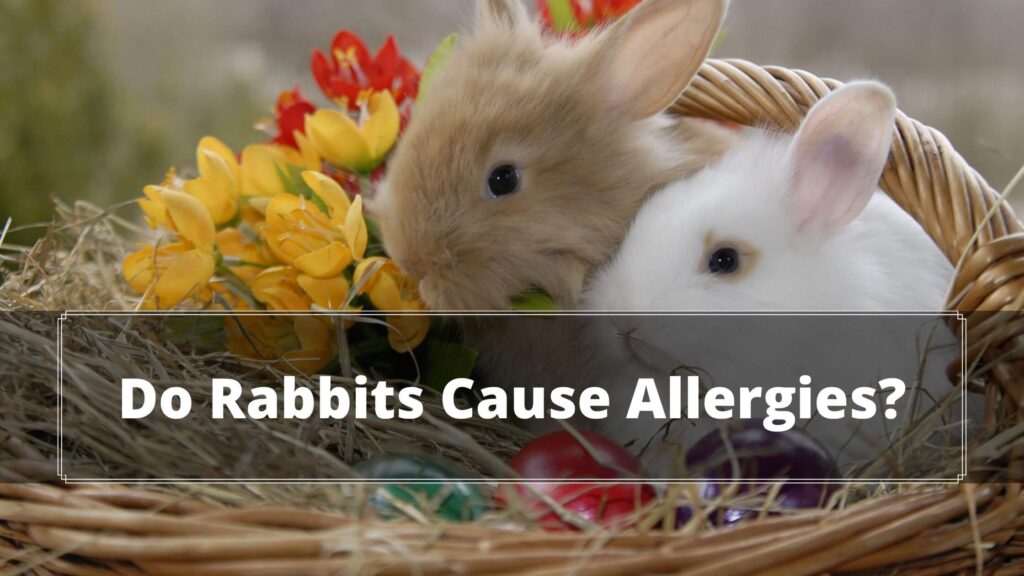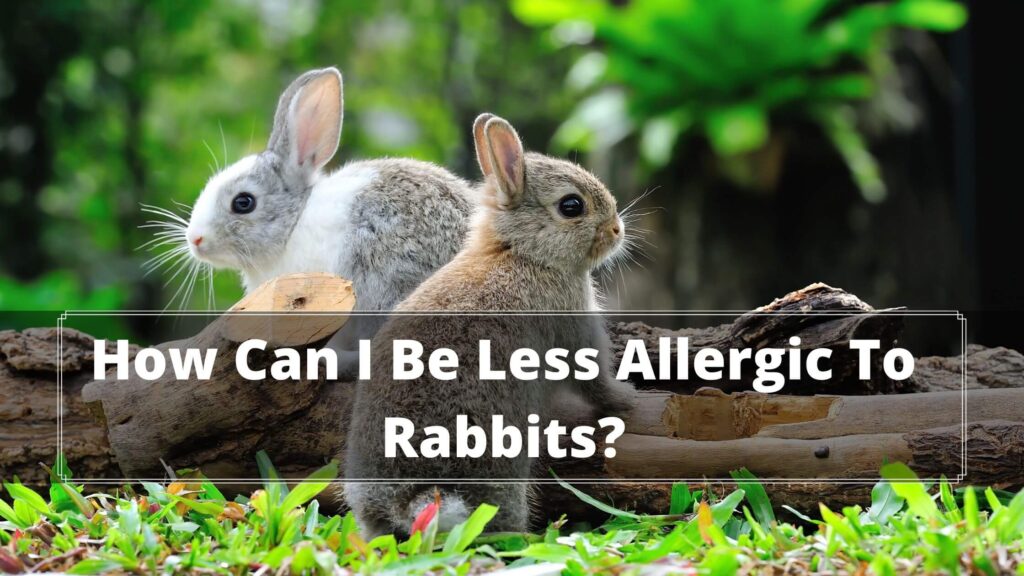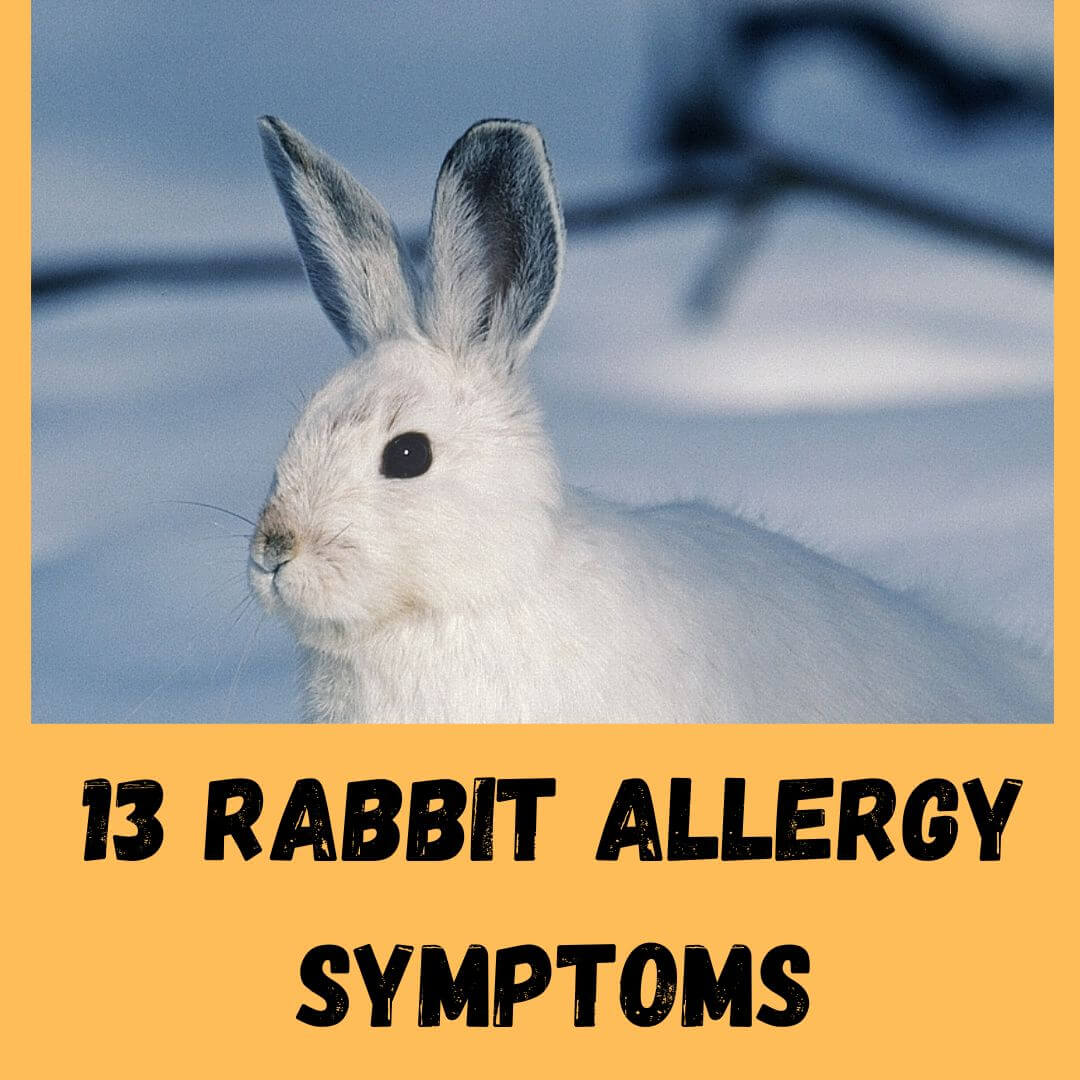Rabbits are one of the most common pets in the United States. But there have been few reports of allergic infections and severe respiratory allergies from household exposure to rabbits. Recently, three patients were admitted with asthma because of a rabbit allergy.
Therefore, it has become quite obvious to ask that rabbits cause allergies. We will discuss whether pet rabbits cause allergies and rabbit allergy symptoms, along with tips that can help you live with rabbit allergies.
Post Contents
Do Rabbits Cause Allergies?

Yes, rabbits can cause allergies to people with sensitive immune systems or asthma. People with mild or severe allergies experience an allergic reaction to proteins found in rabbits’ Saliva. The pollen accumulated on the Rabbit’s coat is also responsible for triggering allergies.
If you are suffering from a pet allergy, then the best strategy will be to reduce your exposure to the Rabbit as much as possible. If you have an over-sensitive immune system, antihistamines or other treatments may be necessary to manage and relieve symptoms.
As we all know, rabbits groom themselves throughout the day, spreading their allergen protein throughout their coat and skin. Hence, this, in turn, sheds heavily in the shedding season, and airborne allergen spreads all over the surrounding environment and air, triggering people’s allergies.
Can Pet Rabbits Cause Allergies?
Yes, pet rabbits can cause allergies. Regarding pet allergies, cats and dogs seem to be the biggest culprit, but rabbits are not very behind. Rabbits are also known to make people cough and sneeze. Any pet animal’s fur or hair can trigger your allergy.
Any person with an over-sensitive immune system can get sick from Pet dander. Apart from the pet dander, the hair and the Saliva on the Rabbit’s fur can also set off an allergic reaction to you. The urine of a pet rabbit also has some chemicals that some people are allergic to. Read our complete guide on: Are Rabbits Good For Allergy Sufferers?
Therefore, it is always recommended to wear a glove and mask when entering the surroundings of a rabbit Hutch or habitat. A few hypoallergenic rabbit breeds are known for causing fewer allergies in people. Read our comprehensive guide on the five best hypoallergenic rabbit breeds you can have as pets if you have mild allergies.
How Are Common Rabbits Allergies?
Rabbit allergies are prevalent in people with sensitive immune systems or asthma. They are more likely to be prone to a pet allergy if allergies or asthma runs in their family. If you are exposed to pets at an early stage, it will help you a lot in avoiding pet allergies.
Many studies have found that kids and children who live with a dog in the first year of their life have better resistance and immune system to upper respiratory infections caused by rabbit allergies compared to those who didn’t have a dog at that age.
How Do You Know If You Are Allergic To Rabbits?
If you are allergic to rabbits, symptoms like sneezing, runny nose, skin irritation, and watery or red eyes will start to exhibit within a few days. This is why cleaning and maintenance practices become vital if you are allergic to animals or pets. Rabbit’s fur.
is not the only culprit for causing Allergies but also the Saliva protein left on its fur after they groom or lick themselves. If you have asthma, a pet rabbit will trigger your problem within a day. I never recommend people with allergies to visit an Animal farm or any pet in the shedding season, spring and fall. Here, you can learn more about 13 rabbit allergy symptoms.
13 Rabbit Allergy Symptoms
- Sneezing
- Cough
- Frequent Awakening
- Post-Nasal Drip
- Nasal Congestion
- Runny Nose
- Itchy Eyes
- Itchy Nose
- Itchy Throat
- Sore Throat
- Watery Eyes
- Red Eyes
- Swollen Eyes
How Can I Be Less Allergic To Rabbits?

Taking medication and treatments can help you be less allergic to Red, but prevention will be the best cure. If you don’t have any pets right now, make sure you don’t have a pet alert before making any commitment. However, if you already have a Rabbit allergy to eating, where are your tips that can help you a lot in the long run?
5 Pro Tips For Living With Rabbit Allergies
Avoid / Minimum Direct Contact
The first mistake people often make touching their face after handling their pet. You should never touch your face if you have recently dealt with any belonging to your Rabbit or your pet.
After holding a pet, always wash your hands. You should avoid cleaning your cage and other belongings if you have severe allergies. Avoiding direct contact or minimizing it will severely lessen the chances of Allergies. You can also adopt one of the 5 most hypoallergenic rabbits
Regular Cleaning & Maintenance
It would help if you vacuumed not only the floor and the furniture but also the window ledges, lamps, curtains, and door frames—vacuum all corners and every item that can accumulate pet dander or rabbit fur. Damping your floors if it is wooden or tiles is also recommended.
Make sure to do some cleaning under your bed and furniture also. You will significantly reduce dust by reducing the clutter and keeping the hay in a tub. Sometimes, you are allergic to your pet’s feed. That’s why You should change their diet with the best rabbit hay for allergies. Frequent cleaning and maintenance are necessary because people often find their supposed rabbit allergy is caused by either hay or dust mites. Not only for you but cleaning & Maintainance is mandatory for your rabbit too. Rabbit. Otherwise, Rabbit snuffle which is collectively termed for sneezing, runny nose, and running Eyes in rabbits.
Invest In A Good Air Purifier With Hepa Filter.
Before investing in any cleaner, you should ensure that it comes with a HEPA filter. The air purifier with a HEPA filter effectively pulls microscopic dust, fur, and other particles from the air. Although Hepa filtration units may be expensive, they can drastically improve your life if you are an allergy sufferer.
If you have budget issues, you can also go with a central air system with electrostatic filters because they’re helpful too (in their ways/terms). However, make sure you clean or change the filters regularly.
- 𝐖𝐇𝐘 𝐂𝐇𝐎𝐎𝐒𝐄 𝐀𝐇𝐀𝐌 𝐕𝐄𝐑𝐈𝐅𝐈𝐃𝐄 𝐀𝐈𝐑 𝐏𝐔𝐑𝐈𝐅𝐈𝐄𝐑𝐒: AHAM (Association of Home Appliance Manufacturers) is an ANSI-accredited organization that sets strict standards for appliance performance. Air purifiers with the AHAM VERIFIDE seal have been independently tested for air cleaning performance, safety, and energy efficiency. When you choose an AHAM certified air purifier, you're choosing a product trusted for reliable and effective indoor air quality improvement.
- 𝐇𝐈𝐆𝐇-𝐏𝐄𝐑𝐅𝐎𝐑𝐌𝐀𝐍𝐂𝐄 𝐀𝐈𝐑 𝐏𝐔𝐑𝐈𝐅𝐈𝐂𝐀𝐓𝐈𝐎𝐍: Powerful 56W High-Torque Motor paired with a 143 CFM CADR ensures fast, effective air cleaning. Cleans rooms up to 1,074 ft² with the original filter. The Levoit original filter is HEPA-grade while operating in Sleep Mode with industry-tested results. Compact Size: 8.7" × 8.7" × 14.2" | Weight: 7.9 lbs – ideal for home, bedroom, or office.
- 𝐀𝐇𝐀𝐌 𝐕𝐄𝐑𝐈𝐅𝐈𝐃𝐄 𝐅𝐎𝐑 𝐏𝐑𝐎𝐕𝐄𝐍 𝐏𝐄𝐑𝐅𝐎𝐑𝐌𝐀𝐍𝐂𝐄: The Core 300-P is AHAM VERIFIDE with CADR (Clean Air Delivery Rate) ratings of 143 CFM for smoke, 153 CFM for dust, and 167 CFM for pollen, giving you verified, transparent results.
- 𝐆𝐄𝐍𝐔𝐈𝐍𝐄 𝐑𝐄𝐏𝐋𝐀𝐂𝐄𝐌𝐄𝐍𝐓 𝐅𝐈𝐋𝐓𝐄𝐑𝐒: For the best performance and longest lifespan, use official Levoit replacement filters. Levoit filters provide the best fit and filtration, while off-brand filters may be unreliable and may damage the air purifier.
- 𝐌𝐔𝐋𝐓𝐈𝐏𝐋𝐄 𝐅𝐈𝐋𝐓𝐄𝐑 𝐂𝐇𝐎𝐈𝐂𝐄𝐒: Choose from a variety of replacement filters to best meet your needs. The Toxin Absorber Filter specializes in smog, toxins, and VOCs, while the Smoke Remover filter addresses smoke from wildfires, smoke, and other particulates. The Pet Allergy Filter captures fur and absorbs unpleasant odors.
Restrict Rabbit Territory & Make Rabbit Free Rooms
The fourth tip would be to reduce the exploration territory of your Rabbit, which in turn will reduce allergens in the house. Rooms like your bedroom and dining room, study room, and kitchen should be of those rooms where your rabbits never visit.
These are the rooms where you will be spending most of your time. Having rabbit-free rooms is an excellent idea for allergy sufferers.
Seek Professional Advice & Medication
To help yourself living with rabbit allergy, you should seek professional advice and consult with a veterinarian. You can also take nasal sprays with anti-inflammatory steroids to help you control severe allergies. Most nasal sprays and antihistamines are good at suppressing the local immune system in the nose and eyes before your allergies get triggered.
You can also take allergy desensitization shots. For most people, regular use of nasal steroid spray does the work in suppressing allergies to rabbits and pollen. Before taking any medication, consult a sympathetic doctor or professional advice to find the one that works for you.
FAQ
Conclusion
If you find out you are allergic, then always prefer keeping your pet out of your bedroom. You should also try to avoid hugging or kissing your Rabbit and if you do so, wash your hand with soap and water thoroughly. Make sure to bathe your Rabbit once a week and regularly clean its area.
A regular vacuum is necessary. As I said throughout the article, install an air purifier with the Hepa filter. Adding to this, you should avoid using pillows made with feathers. If you still face allergies and the tips mentioned above prove less effective in lessening allergic reactions to rabbits, then see allergists.
I tried to deliver all the information around the question: do rabbits cause allergies & if yes, what are rabbit allergy symptoms? If you have any questions regarding this topic, comment below. Do check our other helpful guide on rabbit care. See you soon. Thanks for reading.

94% of pet owners say their animal pal makes them smile more than once a day. In 2007, I realized that I was made for saving Animals. My father is a Vet, and I think every pet deserves one. I started this blog, “InPetCare”, in 2019 with my father to enlighten a wider audience.

